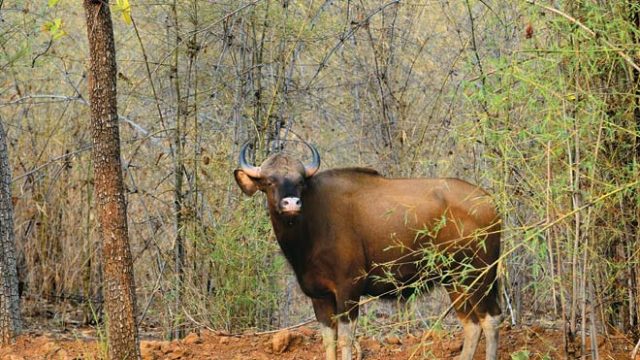Fast facts
State: Maharashtra
Distance: 475 km SE of Mumbai Travel
When to go: The sanctuary is closed between June and October. November-December has fine weather. It can get really hot, really chilly and really wet, in different seasons. Be prepared for November rains. April is hot, but good for animal sightings
Tourist Office: MTDC Kolhapur
Tel: 0231-2652935
Web: maharashtratourism.gov.in
STD code: 02321
Getting there
Rail: Nearest railhead: Kankavli (54 km/1 hr)
Road: NH17 to Tarele via Chiplun and Rajapur. Turn left at Tarele for Phonda Ghat, 18 km away. Dajipur is 12 km from here. You can also drive down via Pune and Kolhapur.
Getting in early is the key to this forest reserve. Even the small unusual birds that hop around the government guest house precincts disappear after nine in the morning. Similarly, jungle life also begins early, and the animals retire before it gets too hot. If you do not get moving when the light is beginning to seep into the sky, you might end up spending your entire time up in the tall jungle watchtower aimlessly staring at your jeep in the empty grassland, without a single sighting. Bison point, the most popular lookout point, is a good 25 km in the interior of the reserve, and it takes 21/2 hrs of being driven on dirt road tracks to get here.
En route, you might see a paradise fly catcher fly past the jeep’s windows in a rapid flurry of white; an index-finger sized sunbird in jewel colours; a wild rooster dashing before you, panicked by the jeep, almost forgetting it can fly away; clusters of unseen male cicadas fluttering their wings and collectively generating that peculiar buzzing sound, then suddenly switching off in perfect unison. Then again, there are those rare, noiseless stretches in the forest, where fronds of moss hang from anjan trees and bend over the karvi undergrowth. The karvi, just one of the surprises of this forest, lives flowerless for six years and in its seventh, dies in a swan song of purple flowers that seem to carpet every inch of the forest floor.
Things to see and do
Early mornings and late evenings are the best times to visit the sanctuary, which lets visitors in from 6.00am to 6.00pm; make the most of it. Visitors have the option of either trekking through the long stretches of kuccha road to the heart of the jungle with their guide, or travelling in a jeep. The topography here is ever changing, from thick forest with undergrowth so dense that even if there is an animal next to you, you won’t see it, to large open meadows of dry grass and wildflowers on a bed of bauxite, where bison come to graze. A large canopy of blue skies crowns the landscape.
Just a few steps down a forest path the Konkan lies spread out before you. There are layers upon layers of mauve hills, sunlight playing over vast stretches of green; lakes in the distance and beyond them, more mountains. A small hamlet gleams in the evening sun.
Karud Ghat, Govandsari Kurli Dam reservoir, Dhamni Dam reservoir and Phonda Ghat are some of the popular tourist spots where the vistas are spectacular.
Down in the village of Dajipur, which is named in honour of the engineer of the dams, is a circular, youthfully designed display hall that tells you more about the inhabitants of the forest, has large mounted labelled photographs and interactive quizzes on display, and pug marks of important forest inhabitants (interspersed with human pug marks!) cast in plaster, in the Hollywood tradition.
Take a walk down to Sunset Point, a few feet away from the large arch that marks the beginning of the Sindhudurg area, and join the tourists trying to carry home a precise memory of this place in the form of a photograph.
Laxmi Talao
If you are staying at Radhanagari, it is well worth the effort to climb the few steps up to see those shores of the Laxmi Talao, the reservoir lake of the Radhanagari Dam. There is a cluster of old ruins on an island in the reservoir where Shahuji is said to have occasionally rested.
Where to stay and eat
Government guest houses are the best here. All of them have large spaces and gardens. Book at least a week in advance and pick up the permission letter from the respective Kolhapur office; and re-confirm before you start. The PWD Rest House (Kolhapur Tel: 0231-2650042, Fax: 2650140; Tariff: INR 470 per person) in Radhanagari offers 2 rooms. For reservations, write/ fax to C/o Executive Engineer, South PWD, Kolhapur. The Irrigation Department’s Inspection Bungalow (Kolhapur Tel: 0231-2654736, Fax: 0231-2654735; Tariff: INR 200 per person), near the Radhanagari Dam, has 2 VIP suites and 2 ordinary rooms. It offers good views of the reservoir. For reservations, write/ fax to C/o Executive Engineer, Kolhapur Irrigation Division, Tarabai Park, Sinchan Bhavan, Kolhapur. The Dajipur Forest Guest House (Kolhapur Telefax: 0231-2542766; Tariff: INR 400 per person, tents INR 1,000-1,400) scores over all others because it is located closest to the forest reserve, making it easier to enter the forest really early in the day. It has 1 room and 3 tents. There is no provision for food, so carry your own supplies. For reservations, write/ fax to Chief Conservator of Forests, Wildlife, and Kolhapur.
Another option is Ekant Homestay (Tel: 08888336668; Tariff: INR 1,800-2,000; www.ekantsolitude.com), near the sanctuary. They serve vegetarian and nonvegetarian food, and all meals are included in the tariff. Owned by the Ingle family, the century-old main house was once a hunting lodge. The fifth generation of the family still lives here.
The government rest houses offer good, basic meals cooked by the care-taker’s family. At Dajipur, where the guest house does not offer food, there are two small and simple eating joints within easy walking distance: the Bison Resort Hotel and Bapucha Hotel at Sunset Point.




